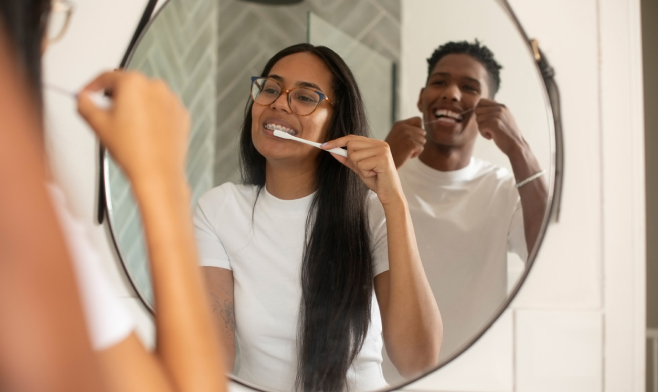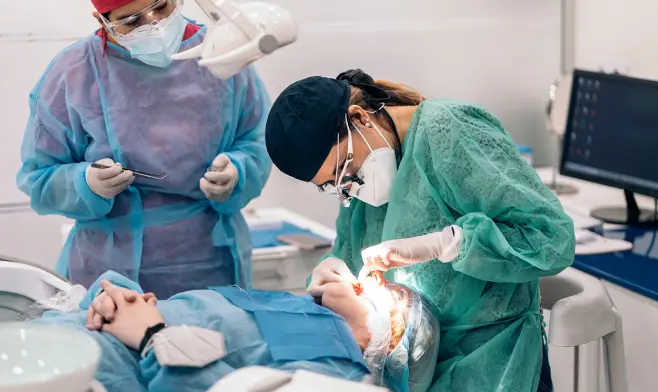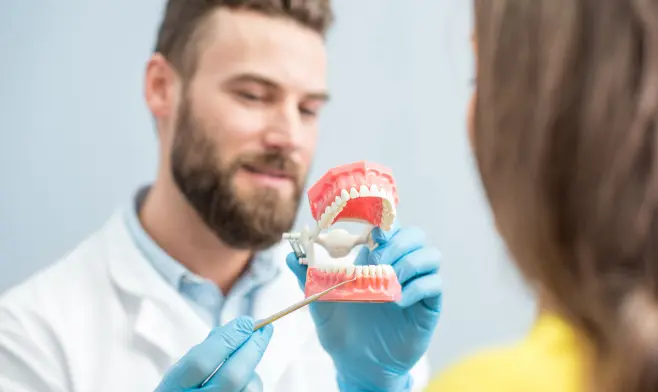Dental implants are one of the most reliable and long-lasting solutions for replacing missing teeth. But like any investment in your health, they require the right care. Without proper maintenance, even a well-placed implant can develop complications that threaten its success. Knowing how to care for dental implants—both immediately after surgery and over the long-term—is key to protecting your smile and avoiding preventable issues.
This guide covers essential dental implant aftercare tips, including cleaning routines, diet recommendations, warning signs to watch for, and when to see your periodontist in Poway. Whether you’ve just had implants placed or are planning ahead, these steps help ensure your implants remain stable, healthy, and functional for years to come.
Why Dental Implant Aftercare Matters
Dental implant aftercare isn’t just about keeping your mouth clean, it’s about protecting a long-term investment in your health. While implants aren’t susceptible to cavities like natural teeth, they’re still vulnerable to gum disease and bone loss if not properly maintained.
Without good hygiene, plaque can accumulate around the implant site, leading to inflammation and infection. Over time, this can develop into peri-implantitis, a serious condition that damages the surrounding bone and can cause the implant to loosen or fail altogether. Treating these complications can be costly and often requires additional procedures.
Taking the time to care for your implants every day significantly lowers these risks and helps ensure your results last. At Poway Perio’s dental implant center, we emphasize prevention and patient education so you can maintain a strong, healthy smile for life.
Daily Cleaning Routine for Implants
Knowing how to clean dental implants properly is essential to keeping them stable and free of infection. While implants look and function like natural teeth, they require slightly more attention when it comes to daily care, especially around the gum line where plaque can accumulate.
Start with a soft-bristle toothbrush and non-abrasive toothpaste. Brush at least twice a day, gently sweeping around the implant crown and gum area. Harsh scrubbing or stiff brushes can irritate the tissue and cause damage over time.
Floss once a day using implant-safe floss or an interdental brush to clean between teeth and around the implant base. Many patients find that a water flosser offers an added level of cleanliness, especially in hard-to-reach areas. Just be sure to follow your periodontist’s recommendations on settings and technique.
Avoid metal picks or sharp tools, as these can scratch the implant surface or injure the gums. Proper implant maintenance is simple once it becomes part of your daily routine, and it goes a long way toward preventing inflammation and complications like peri-implantitis.
Diet Tips & Lifestyle Habits After Dental Surgery
Making smart choices in the days and weeks after your implant procedure can make a big difference in how well you heal. These dental implant recovery tips focus on reducing stress to the surgical site and creating the best environment for your body to recover.
It’s important to know what to eat after dental implants. Start by sticking to soft, mild foods like scrambled eggs, yogurt, oatmeal, smoothies, or mashed vegetables. Avoid anything too hot, spicy, acidic, or crunchy in the early days. Chewing on hard or sticky foods—like nuts, chips, or candy—can put pressure on the healing implant and may interfere with the integration process.
Smoking is one of the biggest risk factors for implant complications. It reduces blood flow, slows healing, and significantly increases the risk of implant failure. If you’re considering quitting, now is the time. Giving up smoking—even temporarily—supports faster recovery and better long-term results.
For more insights on healing and regeneration after oral surgery, visit our guide to the best bone graft materials for dental implants. The right recovery plan—including nutrition and lifestyle—helps protect your investment and sets your implants up for success.
Dental Implant Complications: Warning Signs You Shouldn’t Ignore
According to the American Academy of Periodontology, dental implants are highly successful when properly cared for, but complications can still occur, especially if early warning signs are missed. One of the most serious risks is peri-implantitis, an infection that affects the gum and bone around the implant. Left untreated, it can lead to implant failure.
Common symptoms of a dental implant infection include:
- Persistent bleeding near the implant site
- Red, swollen, or tender gums
- Pain while chewing or brushing
- A loose-feeling implant
- Pus or an unpleasant taste near the implant
These signs often point to inflammation or bacterial buildup, and early treatment is key to peri-implantitis prevention. Don’t ignore discomfort or assume it will pass. Contact your periodontist right away if you notice anything unusual. Prompt care can often stop infection before it causes long-term damage.
At Poway Perio, we’re experienced in identifying and treating implant complications early. Our team can evaluate your symptoms and take steps to preserve both your implant and your overall oral health.
Protect Your Dental Implants for Life
With proper care, dental implants can last for decades, often even a lifetime. The key is staying proactive. That means brushing and flossing daily, sticking to routine cleanings, and knowing what to avoid during healing. It also means watching for early signs of trouble so you can catch issues before they become serious. Without proper daily care and professional follow-ups, patients may develop gum infections around dental implants that threaten long-term implant success.
At Poway Perio, we’re committed to helping you protect your investment through expert care and ongoing support. Whether you’ve just had your implant placed or it’s been years, we’re here to guide you every step of the way. Our team is led by the periodontist who keeps people smiling — you can read more about his background and approach here.
Schedule your implant maintenance appointment or consultation today to keep your smile strong, healthy, and built to last.
FAQ
How do I clean dental implants at home?
Use a soft-bristle toothbrush and non-abrasive toothpaste to gently brush around your implant. Floss daily using traditional floss, floss threaders, or interdental brushes designed for implants. A water flosser can also help remove debris around hard-to-reach areas. Consistent care is key to long-term implant maintenance.
What foods should I avoid after getting implants?
During the healing phase, avoid foods that are hard, sticky, spicy, or extremely hot. These can irritate the surgical site or put pressure on your new implant. Instead, stick to soft foods like yogurt, scrambled eggs, oatmeal, smoothies, and mashed vegetables until your periodontist gives you the go-ahead to resume a normal diet.
Can I get an infection around a dental implant?
Yes. A condition called peri-implantitis can develop when bacteria accumulate around the gumline and cause inflammation or infection. Without treatment, this can damage the surrounding bone and compromise implant stability. Good hygiene and regular professional checkups are essential for peri-implantitis prevention.
How often do dental implants need to be checked?
Most patients should visit their periodontist every 6 to 12 months for implant maintenance cleanings and to ensure everything is functioning properly. These visits allow your provider to monitor your gum health and catch any potential problems early.
What are early signs of dental implant problems?
Watch for symptoms like bleeding gums, persistent pain, swelling, pus around the implant site, or a loose implant. These can be early warning signs of infection or implant failure. If you notice any of these, contact your periodontist as soon as possible for evaluation and care.





